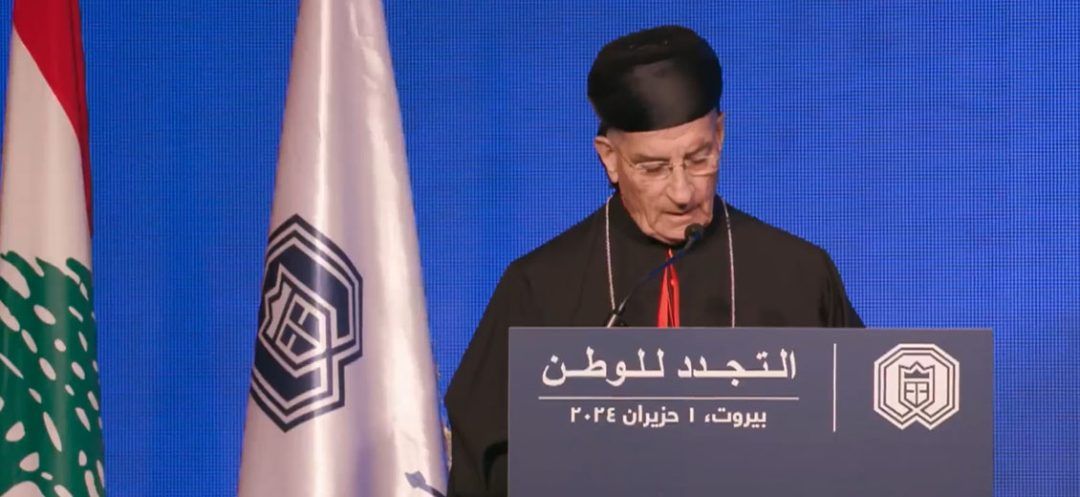
Maronite Patriarch Bechara Boutros Rai issued a stark warning on Saturday about the ongoing presidential vacuum, criticizing recent electoral choices that have not led to meaningful change.
Rai highlighted widespread boycotts and a paralyzed political landscape, stating that "Lebanon has become a class-based country, and when the people rose to improve their situation and when they elected their representative, they chose the wrong name."
Speaking at the "Renewal for the Nation" conference, Rai lamented the current state of national dialogue, stating, "No one dares to initiate an honest national dialogue, and no one sees the point in responding to a dialogue that doesn't address the fundamental issues that have accumulated and turned into ticking time bombs."
Rai urged the nation's leaders to rise above partisan politics and take immediate action. "Isn't it time for us to be true statesmen and immediately elect a president who restores confidence and puts us on the right track to stability?" he asked.
The Patriarch painted a grim picture of Lebanon's current state, describing it as a "scene of chaos and score-settling," where destructive possibilities loom large. He noted the emergence of "social cantons" among the Lebanese, groups that are increasingly discussing ways to politicize themselves, further fragmenting the nation.
Moreover, Rai expressed concern about the societal mindset that seems to prefer enduring crises over seeking solutions. "The Lebanese society has become disobedient to solutions and familiar with problems, as if crises are easier than solutions. The major problem is that the foundational elements that form a nation are what divide the Lebanese," he emphasized.
In a related address, Youssef al-Absi, the Patriarch of Antioch and All the East of the Melkite Greek Catholic Church, echoed Rai's sentiments regarding the deterioration of social cohesion. "Religion was never a barrier between people or a cause for disagreement or separation, but it seems those days have gone with time," Absi said.
He warned against the current trajectory, as national unity is giving way to fragmented entities. "After establishing a nation, we are slipping into creating cantons, emirates or arenas. Sectarianism as a system is one thing, and sectarian thinking is another," Absi added, calling for a renewed commitment to national unity.
Both leaders' statements reflect a deep concern about Lebanon's future, urging immediate and genuine efforts to restore trust, unity and effective governance in the country.
The forum entitled "Lebanon: From the Scene of Conflict to a Nation in the Making," is organized by the Renewal for the Nation group. This is a group of entities from the Lebanese Greek Catholic community. Their goal is to propose policies, solutions and ideas for the country's development. "This is the historically moderating role of Greek Catholics," said Charles Arbid, President of the Lebanese Economic, Social and Environmental Council (ESEC), on the program Ici Eco on This Is Beirut.
According to Arbid, the group to which he belongs is a republican group, centrist in the European sense of the term. Its goal is to unify and decentralize the country. "We need to think about a new electoral law because the existing one does not represent minorities," he said.
His movement wants to encourage young people (especially Greek Catholics) to participate in reflection and national decisions and to feel they are part of this country.
During the forum, guests will be asked to share their opinions on how to move from a scene of conflict to a nation. They will also address the issue of making Lebanon more stable and attractive.
Arbid clarified that the guests come from different sides, and the forum's idea is to listen to their responses to these issues.
A report will be published at the end of the forum.
Rai highlighted widespread boycotts and a paralyzed political landscape, stating that "Lebanon has become a class-based country, and when the people rose to improve their situation and when they elected their representative, they chose the wrong name."
Speaking at the "Renewal for the Nation" conference, Rai lamented the current state of national dialogue, stating, "No one dares to initiate an honest national dialogue, and no one sees the point in responding to a dialogue that doesn't address the fundamental issues that have accumulated and turned into ticking time bombs."
Rai urged the nation's leaders to rise above partisan politics and take immediate action. "Isn't it time for us to be true statesmen and immediately elect a president who restores confidence and puts us on the right track to stability?" he asked.
The Patriarch painted a grim picture of Lebanon's current state, describing it as a "scene of chaos and score-settling," where destructive possibilities loom large. He noted the emergence of "social cantons" among the Lebanese, groups that are increasingly discussing ways to politicize themselves, further fragmenting the nation.
Moreover, Rai expressed concern about the societal mindset that seems to prefer enduring crises over seeking solutions. "The Lebanese society has become disobedient to solutions and familiar with problems, as if crises are easier than solutions. The major problem is that the foundational elements that form a nation are what divide the Lebanese," he emphasized.
In a related address, Youssef al-Absi, the Patriarch of Antioch and All the East of the Melkite Greek Catholic Church, echoed Rai's sentiments regarding the deterioration of social cohesion. "Religion was never a barrier between people or a cause for disagreement or separation, but it seems those days have gone with time," Absi said.
He warned against the current trajectory, as national unity is giving way to fragmented entities. "After establishing a nation, we are slipping into creating cantons, emirates or arenas. Sectarianism as a system is one thing, and sectarian thinking is another," Absi added, calling for a renewed commitment to national unity.
Both leaders' statements reflect a deep concern about Lebanon's future, urging immediate and genuine efforts to restore trust, unity and effective governance in the country.
The forum entitled "Lebanon: From the Scene of Conflict to a Nation in the Making," is organized by the Renewal for the Nation group. This is a group of entities from the Lebanese Greek Catholic community. Their goal is to propose policies, solutions and ideas for the country's development. "This is the historically moderating role of Greek Catholics," said Charles Arbid, President of the Lebanese Economic, Social and Environmental Council (ESEC), on the program Ici Eco on This Is Beirut.
According to Arbid, the group to which he belongs is a republican group, centrist in the European sense of the term. Its goal is to unify and decentralize the country. "We need to think about a new electoral law because the existing one does not represent minorities," he said.
His movement wants to encourage young people (especially Greek Catholics) to participate in reflection and national decisions and to feel they are part of this country.
During the forum, guests will be asked to share their opinions on how to move from a scene of conflict to a nation. They will also address the issue of making Lebanon more stable and attractive.
Arbid clarified that the guests come from different sides, and the forum's idea is to listen to their responses to these issues.
A report will be published at the end of the forum.
Read more



Comments